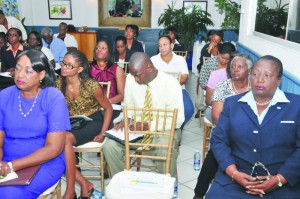
An HIV and Other Life Threatening Illnesses Workplace Policy, to benefit employees in Anguilla, is in an advanced stage of preparation for submission to, and approval by, Executive Council within the next two weeks.
The draft policy, now in circulation among Human Resource executives in the public and private sectors, was the subject of a day-long consultation at CuisinArt Golf Resort and Spa on Wednesday.

Permanent Secretary in the Ministry of Social Development, Dr. Bonnie Richardson-Lake, said in part: “The policy was developed by employing wide multi-sectorial national consultations, with assistance from the International Labour Organisation and the Pan American Health Organisation.
“The policy has several purposes. They include the protection of human rights and dignity in the workplace for persons living with HIV and Other Life Threatening Illness; to eliminate stigma and discrimination against persons; and to intensify prevention and strategies in the workplace through education, information and training.”

“The policy also seeks to protect the rights of persons infected or affected by HIV and Other Life Threatening Illnesses to engage in productive employment. In other words, if persons are able to work we want to create an environment where they can continue to do that productively. It also seeks to develop caring support for workers with HIV and Other Life Threatening Illnesses as well as their families. What the policy doesn’t do, is to dictate to employers how these goals are to be achieved – so each workplace is left to make a determination how to best implement the tenets of this policy in their own setting.”
Minister of Social Development, Edison Baird, said HIV/AIDS was a workplace issue because it threatened productivity, profitability and the welfare of employees and their families. “The workplace is an integral part of the community and, as such, has a vital role to play in terms of prevention and the reduction of stigma and discrimination,” Mr. Baird observed.
“A workplace policy provides the framework for action to reduce the spread of HIV/AIDS as follows: explicitly making a commitment to corporate action; ensuring consistency with appropriate national laws; laying down a standard of behaviour for all employees (whether infected or not); giving guidance to supervisors and managers; helping employees livingwith HIV/AIDS to understand what support and care they will receive, so they are more likely to come forward for voluntary testing; and assisting an enterprise to plan for HIV/AIDS and manage its impact, thus ultimately saving money.”
An Overview of the Workplace Policy was given by the Director of the National AIDS Programme, Mrs.MaezaDemis-Adams. “The policy goal is to provide broad national guidelines to direct the formulation of work-based policies and programmes at the organisational level,” she stated. “It is encouraged that this national policy be adapted by each organisation based on its circumstances, and incorporated into human resource policies.”
Ms Keri Horsford, of the Attorney General’s Chambers, delivered a legal perspective of the policy. According to her, it was not possible to find much legal information on such a policy as a number of laws were silent on the issue. She was, however, of the view that some provisions could be included in the Fair Labour Standards Act governing employment and the rights of workers in Anguilla.







